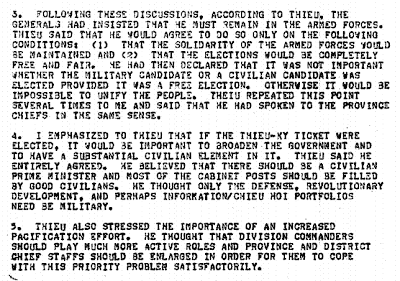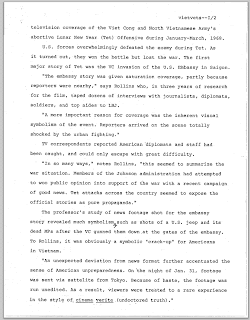I have been struggling to understand how I should feel about the Vietnam war. As you can see by the number of posts on the topic of Eddie Adams, General Loan, and Tet, I find this topic interesting. But there is something else driving it, and it's only been in this last week that I am coming to terms with it.
I have been reading Michael Sandel's book: Justice: What's the Right Thing to Do? and was fascinated by his chapter on John Rawl's "veil of ignorance" theory on how to come up with a fair and impartial point of view.
The veil of ignorance”: to insure impartiality of judgment, the parties are deprived of all knowledge of their personal characteristics and social and historical circumstances. (1)To be objective, which is what I strive for, I need to put aside the fact that it could have been me over there. The fact that it wasn't does not remove that fact. And with that fact, I know that how I feel about the war is not objective, even if my conclusion is valid.
I have gone back in time. I am back at my childhood home, eating dinner with my family. I am driving from Garden Grove California to Carpinteria Beach near Santa Barbara with my family. I am young - but old enough to understand.
I don't recall ever getting into a discussion with my folks regarding the war. We must have talked about it, we talked a lot during dinners. My folks, especially my father, share very black and white views of the world. I remember their disgust for hippies, and one of our relatives who dodged the draft, if I recall. I don't recall anything else except my dad stating a number of times that the reason you do your duty is because your country asked you to. Your country right or wrong he would say.
Now that I am older, I understand a bit better why my dad and others feel that this premise is the guiding reason you do your duty. It's not your place to question when called on. He did it in Korea, his father did it in World War I, my mom's uncles did it. And if the time came for me in Vietnam, the expectation would be that I would do my duty too.
My dad never saw combat, something he regrets, especially when he is with his friends who were called over before the Korean war ended. Maybe had he seen combat he would have had a different opinion. Most likely not. My great uncle Joe lost an arm in D-day. He never spoke about the war and forbid my aunt, who came form Nazi occupied Germany, to speak about the war as well. I am sure if I had talked to him about Vietnam he might have told me something. Most likely not.
Had the war not ended in 1973 and continued on, when I turned 18, I would have been of draft age. And that's the angst I feel right now when I ask my 54 year old self, what would you do now, without your 18 year old veil of ignorance on? (yes, I know that's not what that term means). Hindsight is 20/20. So let me put a figurative veil of ignorance back on and try to look at it objectively.
The problem with the premise of "my country right or wrong" is that it assumes that the "wrong" is an honest mistake or miscalculation. It does not assume manipulation by people to further their own gains and egos.
I am faced with this knowledge of what it was, as I struggle to form my opinion: Should my duty to my country be based on a real need or the need expressed by those who hold power and sway over me? Did Richard Nixon prolong the war because he did not want to be "the first President to lose a war?" (2) Was the desire for "peace with honor" a reason to continue throwing more blood and treasure at it till that objective was achieved? (3)
Did I owe it to Nixon, or any other president, to shed my blood? Was our honor worth giving up my life? Was this what my dad wanted for me? No, I don't think so. What he, and so many others wanted, was for me to concentrate on the duty part. The reason you went was irrelevant when your country called you. That's what young men did. My country, right or wrong!
But that's a romantic notion of war and duty. It assumes nobility, purpose, rationality. Vietnam, as we know now, and started to figure out as it became more and more a cluster, was not a traditional war. And this is where the dynamics in play become antipathetic.
- If I am to perform my duty for my country, shouldn't my effort be for a worthy and rational cause?
- And if it turns out that the premise for the cause was miscalculated, should that miscalculation be rectified?
- And if rectifying it, we choose to end it, does that make the effort up to that point a waste?
- Does my country's need for honor require of me the same effort as for her defense?
Each day to facilitate the process by which the United States washes her hands of Vietnam someone has to give up his life so that the United States doen'st have to admit something that the entire world already knows, so that we can't say they we have made a mistake. Someone has to die so that President Nixon won't be, and these are his words, "the first President to lose a war."
We are asking Americans to think about that because how do you ask a man to be the last man to die in Vietnam? How do you ask a man to be the last man to die for a mistake? But we are trying to do that, and we are doing it with thousands of rationalizations... (4)It can only become antipathetic because guys like General Brady honestly and truly need to believe::
The American soldier was never defeated on the battlefield in Vietnam; our defeat came from the elite in the courtrooms, the classroom, the cloakrooms and the newsrooms, from cowardly media-phobic politicians and irresponsible, dishonest media and professors from Berkeley to Harvard. (5)General Brady has no choice but to voice his displeasure of having his honor taken from him. Honor that is important to him and others. Honor worth dying for. Honor worth perusing, regardless the cost. To call the war a mistake, makes the nullifies the effort. There is no honor in a lost cause, in a mistake. "We were never defeated" General Brady states, but those bastards that looked behind the curtain took from him something he was willing to die for: his country right, or wrong. Duty...honor.
And now it becomes personal once again. Do I have a duty to my country to give my life for something that is no longer rational? Do I have a duty to others who have fulfilled their duty, regardless of that rational? Do I have a duty to uphold the honor of those who did fight? Do I have a duty to them?
And if I do have a duty, is that duty sacrosanct? Do I have a say in how much effort should be put in for that honor? Does honor and duty trump the reality in play? What if the needs of those who hold power and sway or nothing more than a want? What if it is ego, pride, profit, or promotion dictating what my country wants from me?
Can I question it? Can I disagree without being called cowardly, horrible, or bastards? Can I admit it was a mistake without taking honor from those who fought and those who need purpose attached to their effort?
I think I can. I think it can be done without it being antipathetic with the views of General Brady. For this to be done, however, requires us to lose the romantic notion of war, and to see duty as just that; duty. I am called and I answer. And if it turns out you mislead me, manipulated me, or made a terrible miscalculation, my duty is no less noble than anyone else s effort. And that duty goes above and beyond the battle field. We have a duty to point out the mistakes of this country when it has the power to call on its sons and daughters to give up their life for it.
My country right or wrong? No...I don't think it's that simplistic.


















